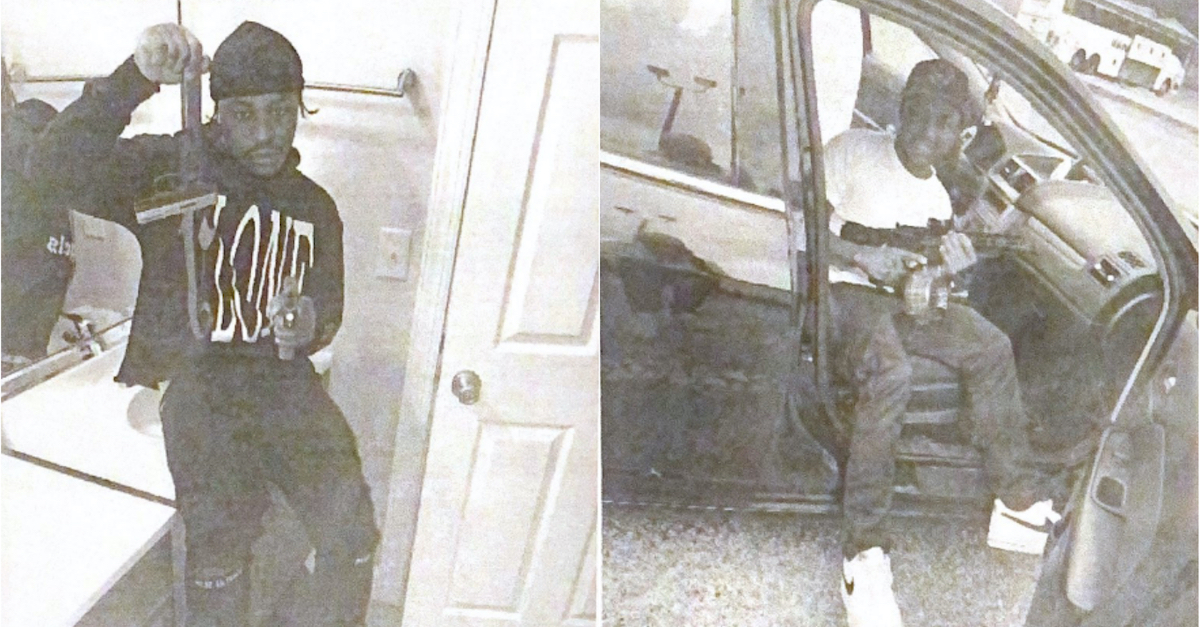
Prosecutors used these social media posts showing Iszayah Rowson with firearms against him. His attorneys say they were taken in Georgia, where the guns are legal. (Photos from court filings)
The Supreme Court’s ruling dramatically expanding gun ownership rights does not protect a Georgia man federally charged with transporting a firearm when he already had been facing a felony indictment, a federal judge ruled.
Thursday’s ruling clarifies the reach of a watershed ruling by Justice Clarence Thomas last year in New York Rifle Assn. v. Bruen, which overturned New York gun regulations. Thomas, together with the court’s conservative majority, established a rule for Second Amendment scrutiny that gun laws must be “consistent with this Nation’s historical tradition of firearm regulation.” The United States has a long history of disarming people perceived to be dangerous, including through explicitly racist laws, the judge noted.
“Consistent with the Shape and Size of a Firearm”
Georgia resident Iszayah Rowson had hoped that the ruling would scuttle his federal prosecution for allegedly transporting a pistol across state lines illegally. On the evening of March 5, 2022, Rowson had been a passenger in the back seat of an Uber, when New York City police pulled the vehicle over because he allegedly wasn’t wearing his seat belt.
Police say that Rowson appeared nervous and started breathing heavily.
“I got nothing on me,” Rowson allegedly told an NYPD officer.
Court papers say that Rowson opened his jacket to show the officer that he didn’t have anything illegal.
“When Rowson opened his jacket, Officer-1 observed a bulge in the front of Rowson’s jeans that was consistent with the size and shape of a firearm,” his criminal complaint states.
Prosecutors say that the officer frisked Rowson and found a Taurus USA Model TX22 pistol.
At a bond hearing, prosecutors cited Rowson’s social media posts posing with firearms as evidence of his dangerousness, but his defense attorneys claimed those had been “taken out of context.”
“The social media posts consisted of pictures of Mr. Rowson carrying what appears to be a firearm,” his attorney John Signoriello acknowledged in his bond application, but he added that metadata showed that the photographs were taken in Georgia, “where such conduct would not be illegal, and prior to any of his arrests.”
That argument failed, and the 22-year-old Rowson has been awaiting trial at Brooklyn’s Metropolitan Detention Center after a judge rejected his application for bond. On Thursday, Rowson’s attorney lost his subsequent constitutional challenges. He claimed that the search violated the Fourth Amendment protections against unreasonable searches and seizures — and challenged the statute their client is being prosecuted under as inconsistent with the Supreme Court’s holding in Bruen.
“Persons Deemed Inherently Dangerous”
U.S. District Judge Paul Engelmayer rejected both of those challenges on Thursday, noting that the United States has a long history of banning people perceived to be dangerous from having guns.
“A long line of statutes predating – and/or present at the founding disarmed persons deemed inherently dangerous,” his opinion states. “These included many statutes that disarmed persons on bases other than a felony (or other) conviction.”
Some of those precedents, the judge noted, discriminated against Black people and Native Americans — though Engelmayer made clear that he was not endorsing those explicitly racist laws.
“It goes without saying that, in our modern era, a law that would disarm a group based on race, nationality, or political point of view or on the assumption that these characteristics bespoke heightened dangerousness – would be anathema, and clearly unconstitutional,” Engelmayer wrote. “But the Second Amendment’s inquiry into historical analogues is not a normative one. Viewing these laws in combination, the above historical laws bespeak a ‘public understanding of the [Second Amendment ] right’ in the period leading up to 1791 as permitting the denial of access to firearms to categories of persons based on their perceived dangerousness.”
Even as the conservative Supreme Court pushed an expansive interpretation of the Second Amendment in recent years, those justices have been consistent about one demarcation line. It’s the same one observed by the late Supreme Court Justice Antonin Scalia in District of Columbia v. Heller.
“Bruen and Heller recognized one such longstanding classification — on gun possession by felons,” the opinion states. “And courts have recognized, based on historical evidence, the common law tradition of disarming classes of individuals based on judgments about whether they were ‘peaceable’ or ‘law-abiding.'”
Setting aside the Fourth Amendment challenge, the judge applied another Thomas-style historical test.
“Colonial and American surety laws derived from a longstanding English tradition of authorizing government agents to seize arms from persons who had acted unlawfully or in a manner that threatened the public,” the opinion states. “Consistent with this tradition, various colonial regulations confiscated weapons from people who were deemed dangerous or apt to disturb the peace. For example, in 1692, Massachusetts authorized ‘every justice of the peace’ to arrest ‘all affrayers, rioters, disturbers or breakers of the peace’ who, ‘upon [the ] view of such justice,’ ‘ride, or go armed offensively’ or cause “fear or affray of their majesties’ liege people,’ and to ‘seize and take away his armour or weapons, and . . . cause them to be apprized and answered to the king as forfeited.'”
Rowson’s lawyer did not immediately respond to an email requesting comment.
Read the opinion below.